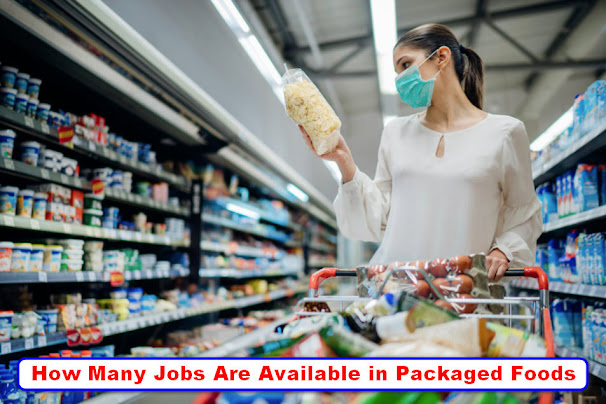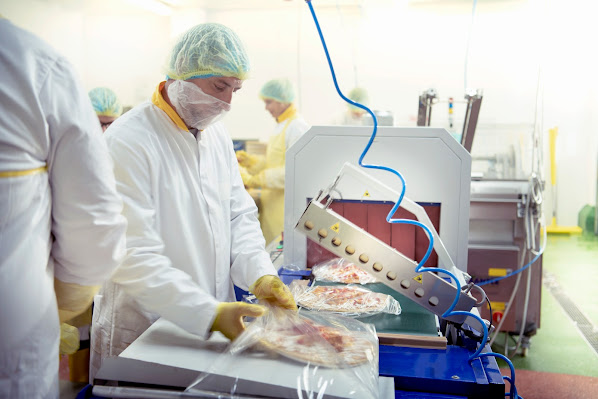How Many Jobs Are Available in Packaged Foods Update 2022, There are more jobs in the manufacturing and packaging industry than you can imagine. It's a great place to look for work if you're looking to advance your career and earn extra income. Manufacturing packaged food remains an attractive industry due to its relatively low fixed costs and limited labor share. The industry is projected to continue growing as the global middle class expands and people continue to purchase value-added prepared foods.
What kind of jobs are there in processed foods?
There are different jobs in packaged food, all of which require different skills. Some employees are responsible for ensuring that products are shipped on time and in good condition, while others are responsible for inventory management or the company's compliance with food safety regulations. .
Jobs in the food industry mainly fall into two categories:
Production and sales. Each consists of several different types of positions, further broken down into specific tasks that need to be completed.
How many jobs are there in the packaged food industry
1. Factory employee
Factory workers perform a variety of jobs in factories. Factory workers can use machines to create different products. We can also assist you in product sorting, inspection, packaging, and product assembly. This role can be seen in industrial settings.
2. Food Safety Inspector
Food inspectors are public health professionals who inspect the safety and labeling of meat, poultry, and other related foods processed in private establishments. She can also perform cleanliness, food storage, and food handling inspections in restaurants and supermarkets.
Food inspectors use their knowledge of nutritional values and ingredients to ensure that packaged foods are safe to eat. Products can be tested for harmful levels of bacteria, chemicals, or contaminants. Inspectors examine food for mold, dirt, insects, and other foreign objects.
Food inspectors also look at the temperature of the food, how clean the surface is, and how effectively the food is stored. They are individually inspected by an inspector before moving on to the next item.
3. Packer
The packer is responsible for packing and shipping the goods from the supplier. They usually work in warehouses, marking and preparing things for transportation. Packers are often assigned inspection tasks such as weighing and measuring products and shipping containers.
We can also inspect warehouses and packing sites regularly to ensure the company's quality. Packaging is an excellent entry option for those wishing to work in the packaging industry.
4. Packaging Technician
A packer is a person who packs food for distribution. They work closely with the production team to ensure products are properly and safely packed for transportation and distribution. You can also be responsible for quality control.
5. Quality control expert
Quality control professionals are responsible for ensuring that raw materials are properly processed before being delivered to stores.
They ensure that the right amount of ingredients are used and that the food meets the company's standards.
6. Oven operator
In commercial bakeries and factories, oven operators oversee the baking process during food production. As part of my job, I am responsible for setting, monitoring, and changing oven temperatures and times. Please control the product during and after firing to ensure product quality.
7. Consumer Behavior Analyst
Consumer Behavior Analysts are also in high demand in the processed food industry. They analyze consumers and select products.
A consumer behavior analyst conducts market research to find out why a particular product is in demand and how people behave when purchasing that item.
8. Refrigeration engineer
Refrigeration engineers design, build, and maintain the company's refrigeration systems. Refrigeration engineers can specialize in either air conditioning or mechanical ventilation.
They apply their basic technical knowledge to create creative designs for air conditioning and mechanical ventilation systems.
9. Package designer
A packaging engineer is a type of engineer who specializes in creating effective packaging for various applications such as transportation, food, and chemical industries. These companies need a secure package that lasts the life of the product, so having an engineer design the package is beneficial. This makes packaging as efficient as possible, reducing bulk and waste.
10. Production Manager
In the general cargo business, the production master is in charge of production. They are also responsible for supervising production workers.
11. Food Scientist
Food scientists use microbiology, engineering, and chemistry to study food degradation and processing. Food scientists analyze the content of foods to determine their nutritional value. They are looking for new nutritious food sources and looking for ways to make processed foods tastier, safer and healthier. They also determine the best ways to distribute, process, store and package foods.
12. Food Safety Manager
Food safety managers are responsible for ensuring that packaged food is safe to eat. They inspect facilities and equipment to ensure they meet sanitary standards. It also monitors and regulates food temperature.
13. Refrigeration engineer
Refrigeration professionals install refrigeration components that require a thorough understanding of blueprints and wiring diagrams. They inspect system components and notify the company.
You will be responsible for overseeing preventative maintenance, diagnosing minor defects and discrepancies, and estimating repair costs and materials. A refrigeration technician must have the mechanical knowledge to identify faults and upgrade the system if necessary.
14. Flavor list
The flavor list's job is to create different flavors and aromas to make the product more appealing to consumers.
Flavorists work in restaurants, bakeries, candy companies, ice cream parlors, and various other food preparation and packaging businesses.
15. Food inspectors
Food inspectors use their knowledge of nutritional values and ingredients to ensure that packaged foods are safe to eat. Products can be tested for harmful levels of bacteria, chemicals, or contaminants. Inspectors look for mold, dirt, insects, and other foreign matter when evaluating food.
Food inspectors also look at the temperature of the food, how clean the surface is, and how effectively the food is stored. They are individually inspected by an inspector before moving on to the next item.
16. Dispatch Coordinator
A shipping coordinator is responsible for collecting and recording shipping information. They organize delivery schedules and select the best delivery option for each item. A shipping coordinator can also assign other employees to different parts of the warehouse or loading point to assist with the shipping process.
17. Quality Control Specialist
Before raw materials are shipped to distributors, quality control specialists ensure that the raw materials are properly processed. They ensure that the right ingredients are used and the dishes meet the company's standards.
Healthier snacks available worldwide
The packaged food industry is diverse. The food packaging sector includes food and non-food manufacturers, paper manufacturers and other packaging materials.
What do I need to do to get a processed food job? If you're looking for a job in this industry, it's important to understand what the job market is like and what skills are needed to be successful. The Bureau of Labor Statistics (BLS) provides detailed information on employment by industry. Here's what you need to know to work in the packaged food industry.
Profession. The number of jobs in this sector increased from 2 million he in 2008 to 2.2 million he in 2013, an increase of 6% in 5 years. However, from 2014 to 2015 he also had a decrease of 1%. As such, we cannot expect employment growth to continue at the previous pace. wages and benefits. In May 2016, the average annual salary for a food industry worker was $34,000, up from $33,600 in May 2015. Meanwhile, all manufacturing workers earned $35,990. Benefits vary according to the size of the company but may include medical insurance and vacations that increase with seniority. Paid time off; Life insurance; Retirement plans; Company stock options;
What do I need to do to get a processed food job?
Processed food is a steadily growing industry. This includes everything from canned and frozen vegetables to fresh produce and dairy.
If you are looking for a processed food job, you need to make sure you have the right skills and training. Most jobs in this field are entry-level or require college or professional education.
What do I need to do to get a processed food job?
Processed food companies are looking for employees with excellent communication skills as well as nutrition and marketing knowledge. That said, if you're interested in working in this field, consider an associate's degree program at an accredited college or university majoring in business, marketing, or public relations. There are also community college and technical school certificate programs to prepare you for entry-level positions in the industry. If you have experience in the food industry, it may be worth getting certified in one of the many accreditation programs offered by leading organizations such as the American Dietetic Association (ADA). Snack packaging options are constantly expanding
The snack food industry is growing, and so are the packaging options. According to independent research firm Packaged Facts, the global snack food market was valued at $845 billion in 2015 and is projected to grow at an annual rate of 8% through 2020.
Packaged Facts estimates that the US snack food market will reach $100 billion in 2016 from $89 billion in 2015. Snacks are defined as all ready-to-eat products that are not meal replacements, including items such as chips, pretzels, and popcorn.
As manufacturers want their products to stand out on store shelves, his options for packaging snack foods continue to grow and become more complex. "If you want to enter a highly competitive category, you need unique packaging," said Joseph Coveney, president of J&J Snack Foods, which makes snack foods under the Pringles brand. "We've been doing this for 50 years."
Packaged food offers a world of possibilities
The food industry is one of the largest industries in the United States and is expected to grow in the coming years. There are different careers available in this field depending on your interests and skills.
Processed food career
The packaged food industry includes companies that manufacture food products that consumers can purchase at grocery stores, convenience stores, and pharmacies. These foods are snacks such as potato chips, frozen foods, and canned foods. The packaged food industry also includes companies that produce food for sale by restaurants and other food service providers such as hospitals and schools. If you enjoy cooking and baking, a job in processed food may be interesting and rewarding.
Packaged food offers a world of possibilities
The appeal of the processed food industry lies in its diversity. There are many different types of jobs in this field, each requiring different skills and training. Some jobs require minimal education, while others require an advanced degree. Some people like to work with their hands, while others prefer to work in an office environment where they don't get their hands dirty!
Vacancies in the packaged food industry
Packaged goods are a major contributor to the American economy. They make up a significant portion of food sales and employ millions of people. The packaged goods market is growing rapidly and there are many opportunities in this sector.
The packaged food industry includes businesses ranging from small street corner stores to large international corporations.
The possibilities depend on the type of packaged food. For example, there are some employment opportunities in the food packaging industry.
There are many jobs in the food industry
To succeed in the packaged food industry, you must have a degree in food science or a related field. Even without a degree, opportunities abound if you have solid organizational skills and perform well under pressure. It is also an advantage if you have prior knowledge of using computers and software programs.
Packaged food of the future
There are many job openings in the food packaging industry. The future of this industry is vibrant and full of opportunities. From assembly line workers to engineers and marketers, there are numerous employment opportunities.
The packaged food sector is constantly changing as new technologies impact how food is packaged and distributed. If you want to work in this business, you have many options.
Advantages of packaged food
Working in the processed food industry has several advantages. The most obvious advantage is access to easily accessible food. Packed foods are convenient for busy people because they can be stored and eaten on the go. It's also often cheaper than perishables, so it's great for the frugal shopper.
Another advantage of working with packaged food is job stability and reliability. The processed food sector is huge and established, so there are some employment opportunities. Also, the business is so mature that it's very easy to predict changes and trends. Therefore, it is ideal for those who want a stable career.
Finally, working in packaged goods is a great way to gain experience in food processing and manufacturing. The packaged food industry is a complex and fascinating business that can provide excellent learning opportunities for those interested in the food system. Those who work in packaged foods gain insight into the operations of food companies and learn about the various processes involved in food production.
What are the duties of a prepackaged food job?
Food packers are responsible for inspecting and sealing containers, loading them into shipping containers, and ensuring that they are properly labeled and held for shipment.
With the development of business, eco-friendly packaging is becoming more and more popular. Workers in the food packaging industry can take charge of developing new environmentally friendly packaging materials.
Food packaging workers are responsible for manufacturing and packaging food products for retail outlets. Their responsibilities include maintaining production lines and complying with safety regulations. You must also be observant and patient when performing repetitive tasks.
A packaging inspector's responsibilities include ensuring product quality and safety and complying with all packaging regulations. You should also check the label and country of origin.
Frequently Asked Questions (FAQ)
What do people who work in the packaged food industry do? The main task of packaged food is to provide customers with quality products while complying with all regulations. Our society needs food all the time, so the packaged food industry is always in high demand.
Why do you want to work in processed food?
Individuals interested in food, agriculture, or the culinary arts can find rewarding careers in processed foods. This is a great career path that offers many benefits such as: For example, opportunities to learn new skills, earn a steady income, and meet new people. What are some examples of packaged foods?
Frozen legumes, nut butters, canned salmon, prepared pesto, prepared packaged cereals, frozen fruit
What is the appeal of packaged foods?
Packaged foods are popular because they are convenient to prepare and consume. City dwellers, often short on time and space, appreciate the convenience of packaged groceries. Packaged food is generally tamper evident, so you can trust it to be safe for consumption. What exactly is the packaged food industry?
Ready meals, baked goods, breakfast cereals, soups, baby food, potato chips, nuts, instant noodles, noodles, cookies, chocolate treats, cheese and yogurt are all part of the packaged food industry.
Who are the top manufacturers of packaged food?
General Mills Inc, Kellogg Co, Unilever Group, Nestle SA and PepsiCo Inc are the top processed food companies.
What are the key elements of the packaged food industry? Breads, breakfast cereals, soups, crackers, cookies, pies and sauces are staples of the packaged food industry. All of these items are regularly consumed as snacks or meals and are often processed to facilitate storage and consumption.
How big is the packaged food industry?
According to 2017 data, the market value of the packaged food industry is US$377.5 billion. The total value of the industry in 2013 was US$354.5 billion. (statistics)
Is working in processed food a viable career option?
Yes, packaged food is a viable career option. The processed food industry offers a variety of jobs that connect farmers and other farm workers with consumers.
Conclusion
From large corporations to small family-owned businesses, there are many opportunities for employees in the processed food industry. Ultimately, this creates a competitive job market that rewards those who take every opportunity and stick with it until they land their dream job. This may seem like a long and tedious process to some, but if you do your research and keep an open mind, you can find unexpected opportunities.
Here you can read our new article about Best Paying Jobs In Services Misc Amusement & Recreation Update 2022.






0 Comments